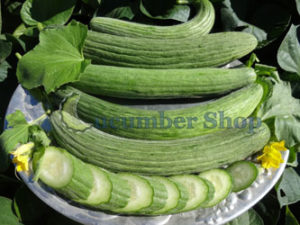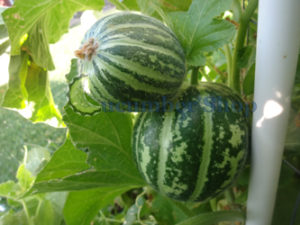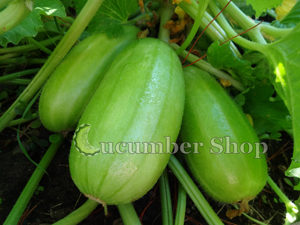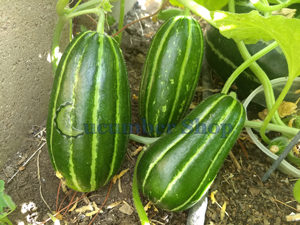The Case for a Rewarding Garden Vegetable
by Guest blogger: Jay Tracy
of ScientificGardener & CucumberShop
Listen to his podcast HERE
I fully empathize with those who choose to avoid the daunting task of starting a garden – or do anything that requires investing large amounts of long-term work, thought or maintenance. After investing years of work into trying to grow tomatoes and other finicky vegetables in my desert southwest garden, I often felt frustrated until I came across a vegetable that grows delicious fruit without much effort in areas where few other palatable vegetables thrive. Vegetable gardening does not need to – nor should it often – entail excessive demands on our physical or mental resources. Each season’s garden should include at least one easily grown and reliably harvested crop. Experiencing success after multiple seasons of trial and error associated with extreme weather has only left me more eager to share this shortcut to a bountiful harvest. Of all the vegetables I have grown over the years, I have discovered that cucumber-melons are the most consistent and rewarding crop to provide motivation for any new, experienced, or even lazy gardener to go through even minimal effort to reap a bountiful reward.

Dark Armenian cucumber
The Cucumber-Melon
When I say cucumber-melons, I am referring to melons (directly related with muskmelons and honeydew) that are grown specifically to be picked immature as cucumbers. These melons taste just like regular cucumbers – except for the lack of bitter or sappy flavor in the mouth or indigestion afterwards. Cucumber-melons such as Armenian cucumbers or carosello are perfect for any new gardener because they address one of the major concerns people have when starting something new: failure. Though major mistakes can lead to plant death, cucumber-melon plants are very forgiving and often bounce back from simple amateur gardening mistakes. In addition to hoping for success, new gardeners often hope that their investment of time and energy in preparing their garden beds will be rewarded. The roots of cucumber- melons have an incredible way of dealing with the soil that they are given to grow in. They can often tolerate a range of soil fertility and even soil that is less than ideal can produce results because they do not drain soil fertility as quickly as some other fruiting crops. This means that the time or monetary investments new gardeners make in soil amendments are not rapidly depleted. In addition, unlike tomatoes, cucumber-melons experience minimal disease pressures which would otherwise leave persistent disease in the soil years to come. In addition to tolerating a range of soil fertility, cucumber melons can be successfully grown in climates where few other vegetables will. Cucumber-melons thrive in climates that are hot and dry and demand less water than many other summer vegetables. This enables new gardeners who live in places where daily watering can be a challenge to still produce cucumbers.

Carosello Massafrese
Varieties galore
While a beginning gardener can appreciate cucumber-melons for their ability to grow and produce well in the first season, the experienced gardener may appreciate growing a crop that presents unlimited breeding possibilities. The incredible range of shapes, sizes, lengths, colors and water content of each cucumber-melon variety provides endless combinations to select from or even to breed a new cucumber-melon variety that better suits the gardener’s needs. To add to the possibilities, variations in vine length and fruit set can be selected to ensure that an experienced vegetable breeder can select for traits that make the fruits adapted to local conditions. Specific traits in cucumber-melons can be selected much more easily than in many other garden vegetable families because the plants do not suffer negative side effects after even multiple generations of selfing (self-pollinating one plant to produce seed). While a seed-saver will appreciate that cucumber-melons can be grown next to regular cucumbers (C. sativus) and produce true seed, an experienced gardener can isolate each cultivar to grow multiple varieties of cucumber-melon each year while still saving pure seed from his favorite fruit.

Carosello Barese cucumber melon
Easy-to-grow
So as not to let new or experienced gardeners have all the fun, even lazy gardeners can grow these easy, low maintenance vegetables. One thing that lazy gardeners might appreciate most is how much less work cucumber-melons require than many other summer vegetables. The minimal ratio of effort required to reap a positive reward is greater with cucumber-melons than any other vegetable I know of. Maintenance of cucumber-melons is very minimal in comparison to many fruiting vegetables. Once soil preparation and irrigation have been taken care of and the vines are established and mulched, the hardest thing to do is wait for the fruit to set. Even the harvest of cucumber-melons is easy to consume. With a thin skin and a juicy crisp texture, the fruit requires minimal work in the area of food prep, (if the fruit makes it to the kitchen). So what if the gardener forgets to water or harvest the fruit? In the more extreme cases of plant negligence on the part of the gardener, the fruit production diminishes from inconsistent watering. However, the plants that persist despite being neglected will likely provide seed better adapted to the gardener’s growing style.

Carosello Medium Long Tarantino cucumber melon
Bountiful Harvest
No matter who you are, if you feel that you have lacked success or been overwhelmed with past gardening experiences, I highly encourage you to try growing something both new and easy. In saying this, I am not promising any kind of miracle other than what can grow from a seed. While growing cucumber-melons may not be for everyone, the benefits of at least making a space in your garden will likely outweigh any negative side-effects. Whether you are a beginning, advanced or even a lazy gardener, having a vegetable crop that can produce a reliable and bountiful harvest is worth more than just thinking about – it’s worth growing.
UrbanFarm.org/rewardinggarden
About this author:
 Jay began gardening in 2006 in Tucson Arizona, then moved to Fairfield, California for cooler weather and health reasons. In Fairfield he has three large garden beds – one at home, two at nearby friends’ houses – and one greenhouse. His blog Scientificgardener.com is where he records his experiments and discusses his love of gardening.
Jay began gardening in 2006 in Tucson Arizona, then moved to Fairfield, California for cooler weather and health reasons. In Fairfield he has three large garden beds – one at home, two at nearby friends’ houses – and one greenhouse. His blog Scientificgardener.com is where he records his experiments and discusses his love of gardening.
Early in his gardening life he found an interest in growing cucumbers and has experimented with common and not-so-common varieties, and with each success, he expands to even more rare varieties. Over time this hobby has expanded to a small business known as the Cucumber Shop.
How to reach Jay:
Website: Cucumbershop.com
YouTube: Cucumber Shop
Email: jay@cucumbershop.com
Blog: Scientificgardener.com







I love gardening, so you gave me the helpful tips I need. Thank you and God speed!